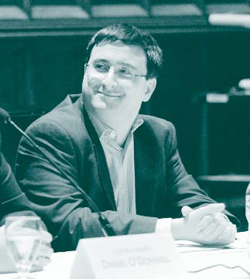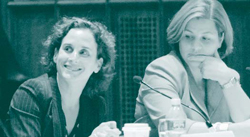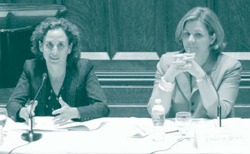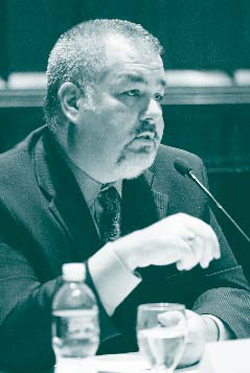Is Gay Marriage Coming to NY?
At Constitution Day at TC, a panel of politicians and experts discusses efforts to legalize same-sex marriage.
When, exactly, will gay couples gain the right to marry in New York
That was New York City Council Speaker Christine Quinn’s take during a panel discussion on marriage equity, held at Milbank Chapel on September 17. Quinn, the first openly gay person to serve as Speaker and an ardent supporter of same-sex marriage, wasn’t alone in her assessment. Fellow panelist Daniel O’Donnell, the New York Assemblymember who has led the effort to legalize same-sex marriage in the state, has come to much the same conclusion.
“I turn 49 in November, and I’ve said all along that by the time I’m 50, I’m going to be a happily married man, and I intend to make that so,” said O’Donnell, the first openly gay man in the state Assembly. “I would hope that that would happen soon but, in the end, if it doesn’t happen in this election cycle, we’ll start all over again.”
O’Donnell has twice led the fight to gain passage of a same-sex marriage bill in the state Legislature, in 2007 and earlier this year. Both times he’s managed to get the bill passed by the Assembly, but the legislation has foundered in the state Senate.
Quinn and O’Donnell were joined in the Constitution Day discussion by Jeffrey Lax, Assistant Professor of Political Science at Columbia University
Same-sex marriage remains a contentious issue, a major front in the culture wars. Six states now sanction same-sex marriages, as do four countries, including Canada
Sommer told the audience that gay couples in New York travel to Connecticut , Vermont and even to Canada to marry, and many New York New York New York
Lax, meanwhile, said that 52 percent of New York
Yet Lax has found that gay and lesbian groups have a steep climb when it comes to passing legislation they care about. Even a large amount of public support is not enough to get such measures passed. Gay and lesbian issues also need a high degree of “salience,” or relevance to voters, as well as visibility and public interest. That is in stark contrast to policies favored by conservatives.
“When do conservative majorities get their way?” Lax asked. “Basically, if there is a conservative majority, they are almost certain to get what they want. This suggests that there is not a liberal bias in such policymaking relative to what the people actually want. There is actually a conservative bias because conservatives get their way. Liberal majorities only get their way when salience is also high.”
O’Donnell said he needs 32 votes in the Senate to get a same-sex marriage bill passed, which means that five Republicans would have to support it. So far, not one Republican has voiced support. O’Donnell encouraged attendees to write to their elected officials in support of marriage equity.
“Not one single state legislator [in the country] who voted for marriage equality has ever lost his seat. Not one,” O’Donnell said. “Politicians are weak people. They’re pack animals. They don’t like to be out on their own….They live in fear, and that fear is that they’re going to lose their seat. So that piece of information—that no one has ever lost their seat—is a very important one in getting politicians to understand that they should not fear being on our side.”
Then, too, times have changed, Quinn said. There is much more openness toward gay and lesbian issues, which bodes well for passing a bill. She referenced a case in the 1990s, in which the New York Police Department was slow to investigate the murder of a gay man as a hate crime. In September, two gay men in Queens won their primary elections for the City Council.
“That happened because people took a huge risk and came out at home and at work, not just in their social life,” Quinn said. “I think the entire progress that marriage equity and LGBT issues have had in this city, state and country are based on two or three very simple but yet not easy things. One is deciding and then becoming a well organized community. What’s inherent in that is then coming out and being visible where you live and where you work, which is not always easy.” V
To view the September 17 panel discussion, visit www.tc.columbia.edu/news/7181.
Published Thursday, Oct. 29, 2009



